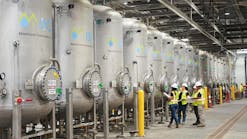Claros Technologies has announced a strategic partnership with Kureha America Inc. to scale up a technology that is capable of capturing, concentrating, and destroying per-and polyfluoroalkyl substances (PFAS) from wastewater.
The technology could be able to capture and concentrate PFAS chemicals, then permanently break their carbon-fluorine bonds into safe, naturally-occurring elements. Kureha will collaborate with Claros to develop a commercially feasible system and install the system for Asian markets.
“We applaud Kureha for its leadership in modeling how manufacturers can be good environmental and social stewards,” said Michelle Bellanca, CEO of Claros Technologies. “We recognize the greatest benefactors of this partnership are the environment and our children, and we share an urgency to close the loop on PFAS pollution.”
PFAS are a class of extremely stable, water- and oil-resisting compounds used in a wide variety of industries and consumer products. Found in drinking water of an estimated 200 million Americans, PFAS pose substantial risk to public and environmental health, having been associated with immunosuppression, reproductive issues, and a variety of cancers. This risk is compounded by the inability of natural processes to break PFAS down due to their extremely strong carbon-fluorine (C-F) bonds, earning PFAS the title of “forever chemicals.”
Currently, PFAS wastes, including spent filter materials, are sent to landfills or are incinerated. These disposal methods do not always break the carbon-fluorine bonds, which could result in reemissions of PFAS into air, water, and land. Consequently, several U.S. states and countries such as Japan are seeking to ban incineration and landfill disposal of PFAS waste.
“Our approach is to concentrate PFAS from millions of gallons of wastewater into a few gallons of PFAS concentrate that can be cost-effectively and permanently destroyed in a traceable fashion. It works on a variety of industry wastewater and even on firefighting foam,” said Abdennour Abbas, Claros founder and CTO. “Changing the way we treat our chemical waste by adopting a closed-loop system will not only reduce risks for the public and the environment but also eliminate latent and future liabilities for manufacturers and waste disposal companies.”



